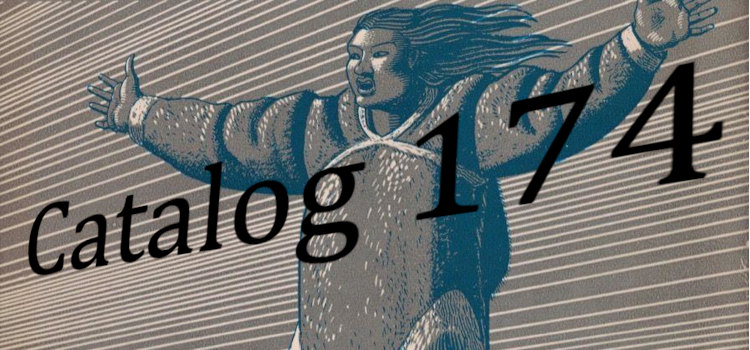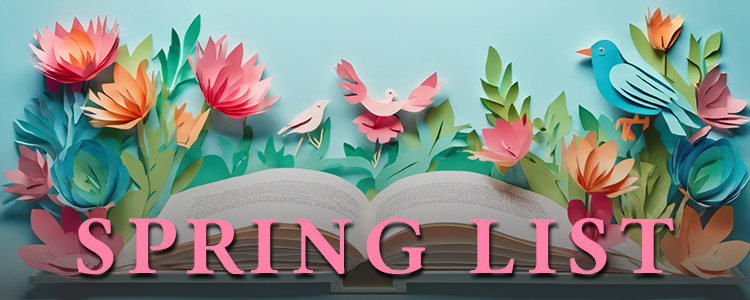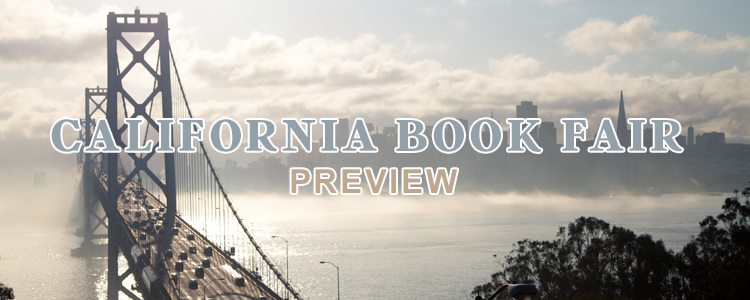 Subscribe
Subscribe
E-list # 130
California Book Fair Preview
O'HARA, John
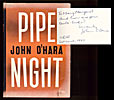 NY, Duell, Sloan and Pearce, (1945). An uncommon book by the author of Butterfield 8 and Appointment in Samarra, among others. Inscribed by the author to WEAF radio personality Mary Margaret McBride in the year of publication: "To Mary Margaret/ and how are your/ taste-buds?/ Sincerely/ John O'Hara/ WEAF/ 20 March 1945." Books inscribed by O'Hara are uncommon, although later in his career he did a number of signed limited editions. A fragile book, cheaply produced under wartime conditions, this is a very attractive copy. Some spotting to rear board and fading to spine cloth; near fine in a very good dust jacket with a couple of small, internally tape-mended edge tears.
[#016359]
$1,000
NY, Duell, Sloan and Pearce, (1945). An uncommon book by the author of Butterfield 8 and Appointment in Samarra, among others. Inscribed by the author to WEAF radio personality Mary Margaret McBride in the year of publication: "To Mary Margaret/ and how are your/ taste-buds?/ Sincerely/ John O'Hara/ WEAF/ 20 March 1945." Books inscribed by O'Hara are uncommon, although later in his career he did a number of signed limited editions. A fragile book, cheaply produced under wartime conditions, this is a very attractive copy. Some spotting to rear board and fading to spine cloth; near fine in a very good dust jacket with a couple of small, internally tape-mended edge tears.
[#016359]
$1,000
OSKISON, John M.
 NY, D. Appleton, 1925. The Cherokee author's first book and, with D'Arcy McNickle's The Surrounded, one of the two most important debuts of modern Native American writers. This one, however, preceding McNickle's book as it does by over a decade, may rightfully be called the first Native American novel of the modern era. Signed by Oskison. A small amount of foxing to the book, and some general, modest signs of wear to the cloth; a very good copy, lacking the scarce dust jacket. A landmark volume, seldom encountered at all, let alone signed.
[#028491]
SOLD
NY, D. Appleton, 1925. The Cherokee author's first book and, with D'Arcy McNickle's The Surrounded, one of the two most important debuts of modern Native American writers. This one, however, preceding McNickle's book as it does by over a decade, may rightfully be called the first Native American novel of the modern era. Signed by Oskison. A small amount of foxing to the book, and some general, modest signs of wear to the cloth; a very good copy, lacking the scarce dust jacket. A landmark volume, seldom encountered at all, let alone signed.
[#028491]
SOLD
PATCHEN, Kenneth
 Prairie City, Decker Press, (1948). An unrecorded variant of this uncommon title. Gray cloth with the same design as that of the apparently first issue yellow cloth, in a blue dust jacket with gold and black lettering, a price of $1 and the words "THE ARCHIVE of Duke University" in place of "Louis Untermeyer" on the dust jacket copy. According to Morgan, Decker printed about 200 copies of this title, about 20 of which were the first issue, although Morgan doesn't account for all known variants. Fine in a mildly sunned, else fine dust jacket.
[#001805]
$1,250
Prairie City, Decker Press, (1948). An unrecorded variant of this uncommon title. Gray cloth with the same design as that of the apparently first issue yellow cloth, in a blue dust jacket with gold and black lettering, a price of $1 and the words "THE ARCHIVE of Duke University" in place of "Louis Untermeyer" on the dust jacket copy. According to Morgan, Decker printed about 200 copies of this title, about 20 of which were the first issue, although Morgan doesn't account for all known variants. Fine in a mildly sunned, else fine dust jacket.
[#001805]
$1,250
PURDY, James
 (n.p.), (n.p.), 1961/1962. Mimeographed typescripts of two one-act plays, which were collected in his 1962 volume entitled Children is All. Inscribed by Purdy on the title page of Cracks to the poet Quentin Stevenson "with the sincere admiration of James" and additionally signed, James Purdy. Children is All (1961) runs 41 pages; Cracks (1962) runs 16 pages. Each is near fine; stapled in the upper left corner. Purdy was a controversial author whose works explored, among other things, gay themes at a time when this was taboo; his popularity and critical reception suffered as a result, but many of his more celebrated contemporaries considered him a genius and a great writer, among them being Tennessee Williams (who wrote a blurb for the book publication of Children is All); Edward Albee (who produced Purdy's play Malcolm); and Gore Vidal, who called him "an authentic American genius" and wrote in the New York Times article entitled "James Purdy: The Novelist as Outlaw" that "Some writers do not gain wide acceptance because their work is genuinely disturbing. Purdy is one of them." As best we can determine, OCLC lists only two copies of the former typescript and one of the latter in institutional collections. Another collection lists "photocopies" of these two plays, but these productions predate plain paper photocopying. Scarce works by a writer whom Jonathan Franzen called "one of the most undervalued and underread writers in America."
[#031486]
$1,500
(n.p.), (n.p.), 1961/1962. Mimeographed typescripts of two one-act plays, which were collected in his 1962 volume entitled Children is All. Inscribed by Purdy on the title page of Cracks to the poet Quentin Stevenson "with the sincere admiration of James" and additionally signed, James Purdy. Children is All (1961) runs 41 pages; Cracks (1962) runs 16 pages. Each is near fine; stapled in the upper left corner. Purdy was a controversial author whose works explored, among other things, gay themes at a time when this was taboo; his popularity and critical reception suffered as a result, but many of his more celebrated contemporaries considered him a genius and a great writer, among them being Tennessee Williams (who wrote a blurb for the book publication of Children is All); Edward Albee (who produced Purdy's play Malcolm); and Gore Vidal, who called him "an authentic American genius" and wrote in the New York Times article entitled "James Purdy: The Novelist as Outlaw" that "Some writers do not gain wide acceptance because their work is genuinely disturbing. Purdy is one of them." As best we can determine, OCLC lists only two copies of the former typescript and one of the latter in institutional collections. Another collection lists "photocopies" of these two plays, but these productions predate plain paper photocopying. Scarce works by a writer whom Jonathan Franzen called "one of the most undervalued and underread writers in America."
[#031486]
$1,500On Sale: $1,125
PYNCHON, Thomas
 NY, Henry Holt, (1997). The uncorrected proof copy in plain blue wrappers (not to be confused with the more common advance reading copy in beige wrappers). This is the second issue uncorrected proof, distinguished from the first issue by virtue of a tipped-in title page that adds the ampersand between "Mason" and "Dixon" that was missing in the first issue. Small bookplate of Ray Roberts, Pynchon's editor, inside front cover. The critic Harold Bloom named Mason & Dixon as his choice for the "single work of sublime fiction from the last century." Fine in wrappers.
[#028528]
SOLD
NY, Henry Holt, (1997). The uncorrected proof copy in plain blue wrappers (not to be confused with the more common advance reading copy in beige wrappers). This is the second issue uncorrected proof, distinguished from the first issue by virtue of a tipped-in title page that adds the ampersand between "Mason" and "Dixon" that was missing in the first issue. Small bookplate of Ray Roberts, Pynchon's editor, inside front cover. The critic Harold Bloom named Mason & Dixon as his choice for the "single work of sublime fiction from the last century." Fine in wrappers.
[#028528]
SOLD
PYNCHON, Thomas
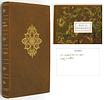 Boston, Little Brown, (1984). One of two leatherbound copies prepared by the publisher, one of which went to Pynchon; this one belonged to Pynchon's editor, Ray Roberts. Small bookplate of Ray Roberts on the pastedown, and a letterhead note card identifying the issue laid in. Fine. This collection of stories featured a new introduction by Pynchon.
[#028516]
SOLD
Boston, Little Brown, (1984). One of two leatherbound copies prepared by the publisher, one of which went to Pynchon; this one belonged to Pynchon's editor, Ray Roberts. Small bookplate of Ray Roberts on the pastedown, and a letterhead note card identifying the issue laid in. Fine. This collection of stories featured a new introduction by Pynchon.
[#028516]
SOLD
PYNCHON, Thomas
 Philadelphia, Lippincott, (1963). The advance reading copy of his first book, winner of the Faulkner Foundation Award for best first novel of the year. With elaborate inventiveness, labyrinthine plots and a sometimes paranoid comic sense, Pynchon became the postmodern standard against whom all writers since have been measured. Each of his first three novels won one or more of the major literary awards given out in this country. Some cover creasing; spine creased from binder's glue and somewhat sunned; a very good copy in wrappers.
[#024611]
SOLD
Philadelphia, Lippincott, (1963). The advance reading copy of his first book, winner of the Faulkner Foundation Award for best first novel of the year. With elaborate inventiveness, labyrinthine plots and a sometimes paranoid comic sense, Pynchon became the postmodern standard against whom all writers since have been measured. Each of his first three novels won one or more of the major literary awards given out in this country. Some cover creasing; spine creased from binder's glue and somewhat sunned; a very good copy in wrappers.
[#024611]
SOLD
PYNCHON, Thomas
 Philadelphia, Lippincott, (1963). His first book, winner of the Faulkner Foundation Award for best first novel of the year and the debut of one of the towering American writers of the postwar era. Slight edge-sunning and a small spot to top stain; a near fine copy in a near fine dust jacket with minor edge wear and some fading to the gold on the lower spine, as is usual with this jacket.
[#016390]
SOLD
Philadelphia, Lippincott, (1963). His first book, winner of the Faulkner Foundation Award for best first novel of the year and the debut of one of the towering American writers of the postwar era. Slight edge-sunning and a small spot to top stain; a near fine copy in a near fine dust jacket with minor edge wear and some fading to the gold on the lower spine, as is usual with this jacket.
[#016390]
SOLD
RANKIN, Ian
 Edinburgh, Polygon, (1986). His first book, a dark novel that is set in Fife, the region of Scotland where the author was born and grew up. Signed by the author on the title page, with a sketch of a gallows and hanged man. This is the hardcover issue, of which there were reportedly only 300 copies printed; after being turned down for publication by several publishers the novel was published by Polygon, a student-run press at Edinburgh University. Fine in a fine dust jacket. A beautiful copy of a scarce first book.
[#028015]
SOLD
Edinburgh, Polygon, (1986). His first book, a dark novel that is set in Fife, the region of Scotland where the author was born and grew up. Signed by the author on the title page, with a sketch of a gallows and hanged man. This is the hardcover issue, of which there were reportedly only 300 copies printed; after being turned down for publication by several publishers the novel was published by Polygon, a student-run press at Edinburgh University. Fine in a fine dust jacket. A beautiful copy of a scarce first book.
[#028015]
SOLD
RAPHAELSON, Samson
 A Tiffany & Co. silver pen with Raphaelson's engraved initials. With the original Tiffany pouch and box, on which is written "Samson Raphaelson's pen" in the hand of Raphaelson's widow, Dorshka. Provenance: the estate of Pauline Kael. Together with a letter from Dorshka Raphaelson to Kael, in 1984, transmitting to her an afghan (not now present) in which "Rafe often dozed, pen in hand, sitting up on his bed, wrapped in his afghan, writing." Bit of tarnish to the pen and foxing to the box; near fine. Raphaelson wrote the 1925 play The Jazz Singer, based on his 1920 story, "The Day of Atonement." Although he did not write the screenplay for The Jazz Singer, he did have a long and successful film career, most notably writing the screenplay for Alfred Hitchcock's 1941 film Suspicion.
[#031747]
SOLD
A Tiffany & Co. silver pen with Raphaelson's engraved initials. With the original Tiffany pouch and box, on which is written "Samson Raphaelson's pen" in the hand of Raphaelson's widow, Dorshka. Provenance: the estate of Pauline Kael. Together with a letter from Dorshka Raphaelson to Kael, in 1984, transmitting to her an afghan (not now present) in which "Rafe often dozed, pen in hand, sitting up on his bed, wrapped in his afghan, writing." Bit of tarnish to the pen and foxing to the box; near fine. Raphaelson wrote the 1925 play The Jazz Singer, based on his 1920 story, "The Day of Atonement." Although he did not write the screenplay for The Jazz Singer, he did have a long and successful film career, most notably writing the screenplay for Alfred Hitchcock's 1941 film Suspicion.
[#031747]
SOLD
REAVEY, George
 NY, Grove Press, (1955). Poetry, issued in a lettered edition of 26 copies and a numbered edition of 250 copies: this is a presentation copy (designated as "s.c. 3 for Nancy"), signed by the author and, as with the lettered issue, with an original drawing by Irene Rice Pereira, the author's wife, signed by the artist as frontispiece. It can be assumed that the presentation copies ("s.c" -- "special copy"?) were even more limited than the lettered copies, as is almost always the case in the issuance of limited editions such as this. A fine copy in a professionally restored dust jacket. Laid in is an autograph holiday card addressed to Nancy and her partner and signed by Reavey for himself and Irene, with an image by Pereira from the collection of the Whitney Museum. A significant volume, with an original work of art by a distinguished American abstract artist: Pereira's work is in the permanent collections of the National Gallery of Art, the National Museum of American Art, and the National Museum of Women in the Arts, among many others.
[#014615]
$1,250
NY, Grove Press, (1955). Poetry, issued in a lettered edition of 26 copies and a numbered edition of 250 copies: this is a presentation copy (designated as "s.c. 3 for Nancy"), signed by the author and, as with the lettered issue, with an original drawing by Irene Rice Pereira, the author's wife, signed by the artist as frontispiece. It can be assumed that the presentation copies ("s.c" -- "special copy"?) were even more limited than the lettered copies, as is almost always the case in the issuance of limited editions such as this. A fine copy in a professionally restored dust jacket. Laid in is an autograph holiday card addressed to Nancy and her partner and signed by Reavey for himself and Irene, with an image by Pereira from the collection of the Whitney Museum. A significant volume, with an original work of art by a distinguished American abstract artist: Pereira's work is in the permanent collections of the National Gallery of Art, the National Museum of American Art, and the National Museum of Women in the Arts, among many others.
[#014615]
$1,250
RICE, Anne
 1988. Rice's own "bible-script" for a film "based on material in the novels Interview with the Vampire, The Vampire Lestat and The Queen of the Damned." Apparently named for the protagonist of all three novels rather than the title of the series' second book. Precedes the release of the film Interview with the Vampire (for which Rice wrote the screenplay) by six years. Development of a new version of The Vampire Lestat followed the success of that first film, but went nowhere and the film rights reverted to the author. A film of The Queen of the Damned followed in 2002, for which Rice did not write the screenplay and which contained many elements of The Vampire Lestat: neither Rice nor the critics approved of the sequel. This "bible-script" of Rice's seems destined to remain the series' missing link. Included here, in addition to Rice's 185 page script, are her list of "main characters, with notes on appearance" (2 pages); her 12-page treatment of a Queen of the Damned film; and one page on the "virtually endless" possibilities for more films (probably correct, as the 13th book in the series was published in 2018). Three hole-punched; mechanically reproduced sheets bound with two brads; title and date written on spine. Printed on rectos only with the header changing from "Rice/Vampires" to "Vampire/Rice" to "Vampire Chronicles." Small tears to the last page at the upper brad; near fine. A rare original work by Rice related to her most famous series of books, which rekindled the use of vampires in literature and the arts as stand-ins for human desire -- a trend that has persisted to the point that it is now a pervasive part of contemporary popular culture. We have been unable to find any record of another copy of this work appearing in the market, nor any evidence of it in institutional collections.
[#032671]
SOLD
1988. Rice's own "bible-script" for a film "based on material in the novels Interview with the Vampire, The Vampire Lestat and The Queen of the Damned." Apparently named for the protagonist of all three novels rather than the title of the series' second book. Precedes the release of the film Interview with the Vampire (for which Rice wrote the screenplay) by six years. Development of a new version of The Vampire Lestat followed the success of that first film, but went nowhere and the film rights reverted to the author. A film of The Queen of the Damned followed in 2002, for which Rice did not write the screenplay and which contained many elements of The Vampire Lestat: neither Rice nor the critics approved of the sequel. This "bible-script" of Rice's seems destined to remain the series' missing link. Included here, in addition to Rice's 185 page script, are her list of "main characters, with notes on appearance" (2 pages); her 12-page treatment of a Queen of the Damned film; and one page on the "virtually endless" possibilities for more films (probably correct, as the 13th book in the series was published in 2018). Three hole-punched; mechanically reproduced sheets bound with two brads; title and date written on spine. Printed on rectos only with the header changing from "Rice/Vampires" to "Vampire/Rice" to "Vampire Chronicles." Small tears to the last page at the upper brad; near fine. A rare original work by Rice related to her most famous series of books, which rekindled the use of vampires in literature and the arts as stand-ins for human desire -- a trend that has persisted to the point that it is now a pervasive part of contemporary popular culture. We have been unable to find any record of another copy of this work appearing in the market, nor any evidence of it in institutional collections.
[#032671]
SOLD
ROHMER, Sax
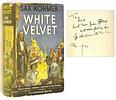 Garden City, Doubleday Doran, 1936. A novel by the prolific British author of the classic Fu Manchu series of fantasy novels, which were immortalized in a series of films, first in the 1930s and then again in the 1960s. Inscribed by Rohmer, "with love," and signed with his trademark "$ax." Bookplate front pastedown; spine-sunned; handling to boards; very good in a very good, modestly edgeworn dust jacket with a dusty rear panel. Books signed by Rohmer are uncommon these days, especially in collectible condition and in dust jacket.
[#021689]
$1,250
Garden City, Doubleday Doran, 1936. A novel by the prolific British author of the classic Fu Manchu series of fantasy novels, which were immortalized in a series of films, first in the 1930s and then again in the 1960s. Inscribed by Rohmer, "with love," and signed with his trademark "$ax." Bookplate front pastedown; spine-sunned; handling to boards; very good in a very good, modestly edgeworn dust jacket with a dusty rear panel. Books signed by Rohmer are uncommon these days, especially in collectible condition and in dust jacket.
[#021689]
$1,250
ROTH, Philip
 Boston, Houghton Mifflin, 1959. His first book, a collection of short fiction including the title novella -- which was the basis for a well-received movie in the Sixties -- and five short stories. Winner of the National Book Award and a Houghton Mifflin Literary Fellowship Award. Top stain a bit faded, and a little rubbing to the board edges; near fine in a very good spine-tanned dust jacket with a few short edge tears. An attractive copy of an auspicious debut, the promise of which was more than fulfilled by the author's subsequent writing career. Roth was one of the few novelists to have his entire body of work re-issued in the Library of America series -- a total of nine volumes, more than any other writer in the series.
[#030786]
SOLD
Boston, Houghton Mifflin, 1959. His first book, a collection of short fiction including the title novella -- which was the basis for a well-received movie in the Sixties -- and five short stories. Winner of the National Book Award and a Houghton Mifflin Literary Fellowship Award. Top stain a bit faded, and a little rubbing to the board edges; near fine in a very good spine-tanned dust jacket with a few short edge tears. An attractive copy of an auspicious debut, the promise of which was more than fulfilled by the author's subsequent writing career. Roth was one of the few novelists to have his entire body of work re-issued in the Library of America series -- a total of nine volumes, more than any other writer in the series.
[#030786]
SOLD
ROTH, Philip
 NY, Simon & Schuster, (1993). Harold Bloom's copy of the uncorrected proof copy of Roth's novel, winner of the PEN/Faulkner Award and Time magazine's Book of the Year; also voted one of the best works of American fiction in a quarter century in a New York Times Book Review survey. Bloom is perhaps most famous for his controversial book The Western Canon, which argued against "the Balkanization of literary studies" and presented an exhaustive list of what he considered to comprise the canon. Six Philip Roth books made it onto Bloom's list, including this title. With a typed note signed by Roth, from two years prior, laid in, in which Roth raves to Bloom about Douglas Hobbie's first novel, Boomfell. The note is folded, else fine. The proof has Bloom's notations on the front cover and summary page; handling apparent to covers; very good in wrappers. A good association copy between one of the leading novelists of his time and one of the leading critics of the day.
[#032317]
SOLD
NY, Simon & Schuster, (1993). Harold Bloom's copy of the uncorrected proof copy of Roth's novel, winner of the PEN/Faulkner Award and Time magazine's Book of the Year; also voted one of the best works of American fiction in a quarter century in a New York Times Book Review survey. Bloom is perhaps most famous for his controversial book The Western Canon, which argued against "the Balkanization of literary studies" and presented an exhaustive list of what he considered to comprise the canon. Six Philip Roth books made it onto Bloom's list, including this title. With a typed note signed by Roth, from two years prior, laid in, in which Roth raves to Bloom about Douglas Hobbie's first novel, Boomfell. The note is folded, else fine. The proof has Bloom's notations on the front cover and summary page; handling apparent to covers; very good in wrappers. A good association copy between one of the leading novelists of his time and one of the leading critics of the day.
[#032317]
SOLD
SALINGER, J.D.
 NY, Little, Brown, (1963). The first issue of Salinger's fourth and last book, which lacks a dedication page. An exceptionally scarce issue -- some knowledgeable sources have speculated that as few as 20 to 30 copies of this issue were released before they were reissued with a tipped-in dedication page, and later a bound-in dedication. Fine in a very near fine dust jacket with a tiny closed catch to the spine. Provenance: the Bruce Kahn collection.
[#911135]
SOLD
NY, Little, Brown, (1963). The first issue of Salinger's fourth and last book, which lacks a dedication page. An exceptionally scarce issue -- some knowledgeable sources have speculated that as few as 20 to 30 copies of this issue were released before they were reissued with a tipped-in dedication page, and later a bound-in dedication. Fine in a very near fine dust jacket with a tiny closed catch to the spine. Provenance: the Bruce Kahn collection.
[#911135]
SOLD
SALINGER, J.D.
 Boston, Little, Brown, 1951. Salinger's classic first book, a coming-of-age novel that has influenced successive generations of young people with its adolescent hero's rejection of the "phoniness" of the adult world around him combined with the authenticity of his voice. Salinger's book retains the freshness it had when first published, and it stands as one of the great fictional accomplishments of 20th century American literature, included on every list of the 100 best novels of the century, and listed as number 2 on the Radcliffe list and number 6 on the Waterstone's list. Minor foxing to top and bottom edges of text block; offsetting to hinges from binder's glue; a very near fine copy in a near fine dust jacket with offsetting to the front flap, tanning to the spine, slight rubbing to the spine folds and light wear to the crown. A very nice copy with distinguished provenance: it was a gift from publisher Alfred A. Knopf to a young writer who was interviewing him for a biography, and who later went on to win the Pulitzer Prize for nonfiction in the 1980s. Letter of provenance available.
[#028107]
SOLD
Boston, Little, Brown, 1951. Salinger's classic first book, a coming-of-age novel that has influenced successive generations of young people with its adolescent hero's rejection of the "phoniness" of the adult world around him combined with the authenticity of his voice. Salinger's book retains the freshness it had when first published, and it stands as one of the great fictional accomplishments of 20th century American literature, included on every list of the 100 best novels of the century, and listed as number 2 on the Radcliffe list and number 6 on the Waterstone's list. Minor foxing to top and bottom edges of text block; offsetting to hinges from binder's glue; a very near fine copy in a near fine dust jacket with offsetting to the front flap, tanning to the spine, slight rubbing to the spine folds and light wear to the crown. A very nice copy with distinguished provenance: it was a gift from publisher Alfred A. Knopf to a young writer who was interviewing him for a biography, and who later went on to win the Pulitzer Prize for nonfiction in the 1980s. Letter of provenance available.
[#028107]
SOLD
SEDARIS, David
 NY/(Chicago), Feature/ICI, (1988). An early issue of this small periodical of gay fiction, printing Sedaris' story "My Manuscript," which was collected in his first book, Barrel Fever in 1994. There are enough textual differences between this version and the collected version to consider this text an earlier draft. An uncommon early appearance by Sedaris.
[#030137]
$750
NY/(Chicago), Feature/ICI, (1988). An early issue of this small periodical of gay fiction, printing Sedaris' story "My Manuscript," which was collected in his first book, Barrel Fever in 1994. There are enough textual differences between this version and the collected version to consider this text an earlier draft. An uncommon early appearance by Sedaris.
[#030137]
$750
SELBY, Hubert, Jr.
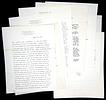 1973-1979. Eleven typed letters signed; one typescript biographical statement; an 8-page hand-corrected typescript of a short story; and an autograph letter signed from Selby's wife, all addressed to Selby's friend, journalist John S. Friedman, who first met Selby after inviting him to speak to his CUNY English class and who later interviewed him for The Village Voice. The earliest piece of writing here (August 24, 1973) is the two-page biographical statement, which is un-addressed. Written in essay form it recounts Selby's near-death experience with tuberculosis in his 20s and how that led to his writing obsession, despite his having "no idea for a story," and his six years of locking himself in his bedroom after work to write Last Exit to Brooklyn. The letters, written 1974-1981 and spanning three addresses (Los Angeles, New York and Greenwich, Connecticut), cover themes such as working on his novel The Demon (unnamed in the letter), but featuring Harry White, "who loved to fuck," while simultaneously working on a play about salvation and a television movie, for Stanley Kramer, about the third Commandment (remembering the Sabbath); finishing his addiction novel Requiem for a Dream, which opens with the protagonist locking his mother in the closet ("Naturally it takes place in the Bronx. Where else could that happen?"); family; money; politics; the quest to turn his writing into film; and his health. The 8-page short story typescript included here is "A Little Respect," a manic 1978 take on a parent believing his son's (television) screen time is detrimental to his social skills. Lastly, there is an undated letter to Friedman from Selby's wife, informing Friedman of Selby's hospitalization with pneumonia. In all, roughly 20 full pages of text by Selby during a time in his life dedicated to work and family. Selby's novel Last Exit to Brooklyn was one of the taboo-smashing works of fiction published by Barney Rosset's Grove Press in the 1960s, alongside such books as William Burroughs' Naked Lunch and the long-suppressed Tropic novels of Henry Miller. Its frank depiction of drug use, homosexuality and violence made it a pivotal work of transgressive fiction. Pages folded for mailing; near fine.
[#032905]
SOLD
1973-1979. Eleven typed letters signed; one typescript biographical statement; an 8-page hand-corrected typescript of a short story; and an autograph letter signed from Selby's wife, all addressed to Selby's friend, journalist John S. Friedman, who first met Selby after inviting him to speak to his CUNY English class and who later interviewed him for The Village Voice. The earliest piece of writing here (August 24, 1973) is the two-page biographical statement, which is un-addressed. Written in essay form it recounts Selby's near-death experience with tuberculosis in his 20s and how that led to his writing obsession, despite his having "no idea for a story," and his six years of locking himself in his bedroom after work to write Last Exit to Brooklyn. The letters, written 1974-1981 and spanning three addresses (Los Angeles, New York and Greenwich, Connecticut), cover themes such as working on his novel The Demon (unnamed in the letter), but featuring Harry White, "who loved to fuck," while simultaneously working on a play about salvation and a television movie, for Stanley Kramer, about the third Commandment (remembering the Sabbath); finishing his addiction novel Requiem for a Dream, which opens with the protagonist locking his mother in the closet ("Naturally it takes place in the Bronx. Where else could that happen?"); family; money; politics; the quest to turn his writing into film; and his health. The 8-page short story typescript included here is "A Little Respect," a manic 1978 take on a parent believing his son's (television) screen time is detrimental to his social skills. Lastly, there is an undated letter to Friedman from Selby's wife, informing Friedman of Selby's hospitalization with pneumonia. In all, roughly 20 full pages of text by Selby during a time in his life dedicated to work and family. Selby's novel Last Exit to Brooklyn was one of the taboo-smashing works of fiction published by Barney Rosset's Grove Press in the 1960s, alongside such books as William Burroughs' Naked Lunch and the long-suppressed Tropic novels of Henry Miller. Its frank depiction of drug use, homosexuality and violence made it a pivotal work of transgressive fiction. Pages folded for mailing; near fine.
[#032905]
SOLD
SMITH, Clark Ashton
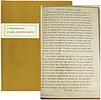 Undated. A one-page prose poem, typed, and signed "Clark Ashton Smith/Auburn, California." This version of the prose poem differs in a number of particulars from the published version, which was included in The Abominations of Yondo (Arkham House, 1960) and Poems in Prose (Arkham House, 1965). Previously folded in thirds but now in a custom binder, bearing the bookplate of horror writer Stanley Wiater, from whose library this came. Fine, with a letter laid in to Wiater from Roy Squires, the noted science fiction collector and dealer, from whom Wiater purchased it. Squires' lengthy letter comments extensively on the appallingly high prices "being asked -- and paid -- for the more desirable Arkham House books," in 1972, and then goes on to justify the high price Wiater had just paid for the Clark Ashton Smith manuscript, and says that he knows of only four prose poem manuscripts by Clark Ashton Smith in existence -- this one; one that he himself still had; and two that Smith's widow had at that time. A rare typescript by one of the most important American horror writers of the 20th century, with a long, illuminating letter from one of the great collectors and dealers in the field, and from the library of a horror writer who has been a three-time winner of the Bram Stoker Award, given by the Horror Writers of America.
[#029000]
$5,500
Undated. A one-page prose poem, typed, and signed "Clark Ashton Smith/Auburn, California." This version of the prose poem differs in a number of particulars from the published version, which was included in The Abominations of Yondo (Arkham House, 1960) and Poems in Prose (Arkham House, 1965). Previously folded in thirds but now in a custom binder, bearing the bookplate of horror writer Stanley Wiater, from whose library this came. Fine, with a letter laid in to Wiater from Roy Squires, the noted science fiction collector and dealer, from whom Wiater purchased it. Squires' lengthy letter comments extensively on the appallingly high prices "being asked -- and paid -- for the more desirable Arkham House books," in 1972, and then goes on to justify the high price Wiater had just paid for the Clark Ashton Smith manuscript, and says that he knows of only four prose poem manuscripts by Clark Ashton Smith in existence -- this one; one that he himself still had; and two that Smith's widow had at that time. A rare typescript by one of the most important American horror writers of the 20th century, with a long, illuminating letter from one of the great collectors and dealers in the field, and from the library of a horror writer who has been a three-time winner of the Bram Stoker Award, given by the Horror Writers of America.
[#029000]
$5,500
STONE, Robert
 Boston, Houghton Mifflin, 1967. A review copy of his first book, a novel of drifters in New Orleans in the early Sixties caught up in the web of a quasi-religious political machine. Winner of the William Faulkner Award for best first novel of the year as well as a Houghton Mifflin Literary Fellowship Award. Signed by the author. Tiny lower corner bump and shelf wear to lower boards; else a fine copy in a very near fine dust jacket with a touch of rubbing on the rear panel. Promotional author photo laid in, with incorrect publication date. Basis for a film, WUSA (the call letters of the right-wing radio station that figures prominently in the book), starring Paul Newman, Joanne Woodward and Anthony Perkins.
[#914685]
SOLD
Boston, Houghton Mifflin, 1967. A review copy of his first book, a novel of drifters in New Orleans in the early Sixties caught up in the web of a quasi-religious political machine. Winner of the William Faulkner Award for best first novel of the year as well as a Houghton Mifflin Literary Fellowship Award. Signed by the author. Tiny lower corner bump and shelf wear to lower boards; else a fine copy in a very near fine dust jacket with a touch of rubbing on the rear panel. Promotional author photo laid in, with incorrect publication date. Basis for a film, WUSA (the call letters of the right-wing radio station that figures prominently in the book), starring Paul Newman, Joanne Woodward and Anthony Perkins.
[#914685]
SOLD
STONE, Robert
 (n.p), (n.p.), [ca. 1983]. In 1983, Robert Stone, National Book Award-winning novelist, was commissioned to write a piece on George Orwell and his dystopian novel Nineteen Eighty-Four, as that calendar year approached. In the piece, Stone made an effort to reclaim Orwell from the conservative right wing, which had taken his most famous, anti-totalitarian novels -- Nineteen Eighty-Four and Animal Farm -- to be explicit condemnations of the Soviet Union and Communism, and by implication all leftist thought itself. Instead, Stone argues that Orwell's writing in Homage to Catalonia -- not to mention his fighting on the Republican side in the Spanish Civil War -- identifies Orwell as someone with both a socialist sympathy and "a certain affinity with what I believe is best about the United States," a kind of Puritanism that is characterized by "rectitude...conscience and common sense." He goes on to point out that Orwell "was the sort of radical who makes enemies on both sides of epic struggles," owing to his "originality and intelligence, [and] above all his thoroughgoing honesty, [which] always got him in trouble. A writer and man more predictable and dull, less infernally scrupulous would have had a better time of it." Stone adds that Orwell was idealistic but non-ideological -- as Stone was himself -- and deeply committed to the kind of "pragmatism that has characterized American moral thinkers from Jefferson to James to Neibuhr." He concludes that "We may never produce a greater political novel than Nineteen Eighty-Four" and that "it has done its work for us" in shaping our fears and cautions sufficiently for us to have avoided the totalitarian dystopia that was latent in the post-War years of the Cold War. The confluence of writer and subject here was, in many ways, a near-perfect one but the piece seems never to have been published; we can find no record of it; a cover letter from Stone's wife, Janice, indicates this was done for Thames Television, but whether it was produced or used remains unknown to us. One of Stone's novels includes an allusion to a critical moment in Nineteen Eighty-Four: Stone's character explains that one has "to look the gray rat in the eye" -- an allusion to the torture by rats that Winston Smith, in Nineteen Eighty-Four, is faced with, which causes him to "break" and betray himself and his loved ones. 18 pages, ribbon copy typescript, with Janice Stone's cover letter, laid into an agent's folder. Fine. An unknown Robert Stone piece, on a subject that touches close to many of the central and pervasive themes of his own writings. Unique.
[#032829]
$8,500
(n.p), (n.p.), [ca. 1983]. In 1983, Robert Stone, National Book Award-winning novelist, was commissioned to write a piece on George Orwell and his dystopian novel Nineteen Eighty-Four, as that calendar year approached. In the piece, Stone made an effort to reclaim Orwell from the conservative right wing, which had taken his most famous, anti-totalitarian novels -- Nineteen Eighty-Four and Animal Farm -- to be explicit condemnations of the Soviet Union and Communism, and by implication all leftist thought itself. Instead, Stone argues that Orwell's writing in Homage to Catalonia -- not to mention his fighting on the Republican side in the Spanish Civil War -- identifies Orwell as someone with both a socialist sympathy and "a certain affinity with what I believe is best about the United States," a kind of Puritanism that is characterized by "rectitude...conscience and common sense." He goes on to point out that Orwell "was the sort of radical who makes enemies on both sides of epic struggles," owing to his "originality and intelligence, [and] above all his thoroughgoing honesty, [which] always got him in trouble. A writer and man more predictable and dull, less infernally scrupulous would have had a better time of it." Stone adds that Orwell was idealistic but non-ideological -- as Stone was himself -- and deeply committed to the kind of "pragmatism that has characterized American moral thinkers from Jefferson to James to Neibuhr." He concludes that "We may never produce a greater political novel than Nineteen Eighty-Four" and that "it has done its work for us" in shaping our fears and cautions sufficiently for us to have avoided the totalitarian dystopia that was latent in the post-War years of the Cold War. The confluence of writer and subject here was, in many ways, a near-perfect one but the piece seems never to have been published; we can find no record of it; a cover letter from Stone's wife, Janice, indicates this was done for Thames Television, but whether it was produced or used remains unknown to us. One of Stone's novels includes an allusion to a critical moment in Nineteen Eighty-Four: Stone's character explains that one has "to look the gray rat in the eye" -- an allusion to the torture by rats that Winston Smith, in Nineteen Eighty-Four, is faced with, which causes him to "break" and betray himself and his loved ones. 18 pages, ribbon copy typescript, with Janice Stone's cover letter, laid into an agent's folder. Fine. An unknown Robert Stone piece, on a subject that touches close to many of the central and pervasive themes of his own writings. Unique.
[#032829]
$8,500
STYRON, William
 Indianapolis, Bobbs-Merrill, (1951). Styron's first book, inscribed to the writer Jonathan Carroll: "with best wishes/ William Styron/ 27 September 1971/ (Twenty years, to the month, after publication)." The date is also nine years before Carroll's first published book, The Land of Laughs. Laid in is a typed note signed by Styron in which he agrees to the signing; based on the address, Carroll would have been an English teacher at the time, in North Carolina. The book is unevenly sunned on the cloth and bears a few small stains; very good in a jacket with modest edge wear including one edge tear, and a vertical crease to the spine; still very good. The note is folded, else fine, with a chipped mailing envelope included. A nice association copy of an important first novel. Forty years after this inscription, on the occasion of Styron's death in 2011, Carroll wrote a blog post on his website, referring to Styron as a "great American novelist."
[#026147]
SOLD
Indianapolis, Bobbs-Merrill, (1951). Styron's first book, inscribed to the writer Jonathan Carroll: "with best wishes/ William Styron/ 27 September 1971/ (Twenty years, to the month, after publication)." The date is also nine years before Carroll's first published book, The Land of Laughs. Laid in is a typed note signed by Styron in which he agrees to the signing; based on the address, Carroll would have been an English teacher at the time, in North Carolina. The book is unevenly sunned on the cloth and bears a few small stains; very good in a jacket with modest edge wear including one edge tear, and a vertical crease to the spine; still very good. The note is folded, else fine, with a chipped mailing envelope included. A nice association copy of an important first novel. Forty years after this inscription, on the occasion of Styron's death in 2011, Carroll wrote a blog post on his website, referring to Styron as a "great American novelist."
[#026147]
SOLD
THOMPSON, Hunter S.
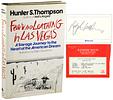 NY, Random House, (1971). A review copy of Thompson's second and most famous book, a classic of the freewheeling, drug-ingesting Sixties, illustrated with hilarious and scary pen-and-ink drawings by Ralph Steadman. With the publisher's review slip laid in giving the date of publication (June 26, 1972) and with a bookplate laid in signed by Ralph Steadman. Boards lightly edge-sunned, as usual; else fine in a very near fine dust jacket, with mild fading to the red spine lettering. Basis for the Terry Gilliam film with Johnny Depp and Benicio del Toro; one of the key books of the gonzo genre; and scarce as an advance copy.
[#027496]
SOLD
NY, Random House, (1971). A review copy of Thompson's second and most famous book, a classic of the freewheeling, drug-ingesting Sixties, illustrated with hilarious and scary pen-and-ink drawings by Ralph Steadman. With the publisher's review slip laid in giving the date of publication (June 26, 1972) and with a bookplate laid in signed by Ralph Steadman. Boards lightly edge-sunned, as usual; else fine in a very near fine dust jacket, with mild fading to the red spine lettering. Basis for the Terry Gilliam film with Johnny Depp and Benicio del Toro; one of the key books of the gonzo genre; and scarce as an advance copy.
[#027496]
SOLD
THOMPSON, Hunter S.; STEADMAN, Ralph
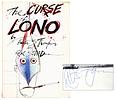 NY, Bantam, (1983). Text by Thompson and illustrations by Steadman, recounting the duo's trip to cover the Honolulu marathon for Running magazine. Thompson's fifth book, and his fourth collaboration with Steadman. This copy is signed by the author "H.S. Thompson." Only issued in wrappers (until a Taschen edition in 2005). Near fine with a shallow stain at the upper outer corner and a bit of wear at the base of the spine. One of the scarcest books to find signed by Thompson, perhaps because the perfectbound sheets tend to pop loose if the book is opened too widely or too roughly.
[#030833]
SOLD
NY, Bantam, (1983). Text by Thompson and illustrations by Steadman, recounting the duo's trip to cover the Honolulu marathon for Running magazine. Thompson's fifth book, and his fourth collaboration with Steadman. This copy is signed by the author "H.S. Thompson." Only issued in wrappers (until a Taschen edition in 2005). Near fine with a shallow stain at the upper outer corner and a bit of wear at the base of the spine. One of the scarcest books to find signed by Thompson, perhaps because the perfectbound sheets tend to pop loose if the book is opened too widely or too roughly.
[#030833]
SOLD
TOFFLER, Alvin
 NY, Random House, (1970). A review copy of Toffler's massively successful book naming the disorientation caused by the accelerated pace of cultural and technological change. Laid in are three different 2-legal-page press releases: "Future Shock May Be Key Disease of Tomorrow," "Movement for 'Responsible Technology' Needed to Combat Future Shock," and "To Prevent Future Shock, Schools Must Teach About Tomorrow." From the first: "When people complain they can't cope, what is it they can't cope with?" From the second: "... technological questions can no longer be answered in technological terms alone. 'They are political questions...we need a machinery for screening machines.'" From the third: "Today events are moving so swiftly that only another [post-John Dewey] radical shift in our 'time-bias' can save our children. The schools must develop future-consciousness." The press releases are folded in fourths; the book has mild edge-foxing and is near fine in a very near fine dust jacket with a shallow crease to the rear panel. Uncommon in the first edition, with jacket, and with promotional material. A book so correct in its premises that it now seems almost quaintly outdated.
[#032329]
SOLD
NY, Random House, (1970). A review copy of Toffler's massively successful book naming the disorientation caused by the accelerated pace of cultural and technological change. Laid in are three different 2-legal-page press releases: "Future Shock May Be Key Disease of Tomorrow," "Movement for 'Responsible Technology' Needed to Combat Future Shock," and "To Prevent Future Shock, Schools Must Teach About Tomorrow." From the first: "When people complain they can't cope, what is it they can't cope with?" From the second: "... technological questions can no longer be answered in technological terms alone. 'They are political questions...we need a machinery for screening machines.'" From the third: "Today events are moving so swiftly that only another [post-John Dewey] radical shift in our 'time-bias' can save our children. The schools must develop future-consciousness." The press releases are folded in fourths; the book has mild edge-foxing and is near fine in a very near fine dust jacket with a shallow crease to the rear panel. Uncommon in the first edition, with jacket, and with promotional material. A book so correct in its premises that it now seems almost quaintly outdated.
[#032329]
SOLD
TOOLE, John Kennedy
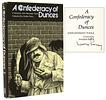 Baton Rouge, Louisiana State University Press, 1980. Signed by Walker Percy. A posthumously published novel that was the first work of fiction published by the LSU Press: and which had a very small first printing (reportedly 2500 copies), Initially the book was rejected by dozens of publishers and the author committed suicide in 1969. Years later the author's mother brought the manuscript to Walker Percy, insisting that he read it. Percy overcame his initial hesitations and championed the book, arranging for its publication and contributing an introduction. Excellent reviews and word of mouth led to its becoming a best-seller, and it won the Pulitzer Prize. One tiny foredge spot, else a fine and tight copy (the boards tend to splay on most copies) in a very near fine, first issue dust jacket with only trace wear to the corners and a hint of rubbing near the spine crown. A high spot of American fiction over the last half century.
[#032691]
SOLD
Baton Rouge, Louisiana State University Press, 1980. Signed by Walker Percy. A posthumously published novel that was the first work of fiction published by the LSU Press: and which had a very small first printing (reportedly 2500 copies), Initially the book was rejected by dozens of publishers and the author committed suicide in 1969. Years later the author's mother brought the manuscript to Walker Percy, insisting that he read it. Percy overcame his initial hesitations and championed the book, arranging for its publication and contributing an introduction. Excellent reviews and word of mouth led to its becoming a best-seller, and it won the Pulitzer Prize. One tiny foredge spot, else a fine and tight copy (the boards tend to splay on most copies) in a very near fine, first issue dust jacket with only trace wear to the corners and a hint of rubbing near the spine crown. A high spot of American fiction over the last half century.
[#032691]
SOLD
UPDIKE, John
 Kittery Point, William Dean Howells Memorial Committee, 1987. One of 150 copies printed of a lecture Updike gave at Harvard as part of the 150th anniversary of Howells' birth. Published in a slightly altered form in The New Yorker, this is the first separate appearance, with an Author's Note by Updike. Approximately 40 pages of text; fine in self-wrappers with complimentary slip from the publisher laid in. Updike won the Howells Medal years later, in 1995, for Rabbit at Rest; the medal is given out for the best work of fiction in America during a five-year period. One of Updike's scarcest "A" items.
[#028555]
$1,000
Kittery Point, William Dean Howells Memorial Committee, 1987. One of 150 copies printed of a lecture Updike gave at Harvard as part of the 150th anniversary of Howells' birth. Published in a slightly altered form in The New Yorker, this is the first separate appearance, with an Author's Note by Updike. Approximately 40 pages of text; fine in self-wrappers with complimentary slip from the publisher laid in. Updike won the Howells Medal years later, in 1995, for Rabbit at Rest; the medal is given out for the best work of fiction in America during a five-year period. One of Updike's scarcest "A" items.
[#028555]
$1,000
UPDIKE, John
 Newburyport, Wickford Press, 1968. A limited edition of a humorous essay on encounters with (other) famous authors, which first appeared in the New York Times. Number 56 of 250 numbered copies. Issued unsigned, this copy is inscribed by the author in 1997: For ___ ___ and her fabulous collection/ Cheers, John Updike." One of Updike's earliest limited editions, done the same year as Bath After Sailing and The Angels. Although the limitation of this title is larger than either of those, we have encountered it just as infrequently. Faint sunning at the edge of the spine, else fine.
[#030849]
$1,000
Newburyport, Wickford Press, 1968. A limited edition of a humorous essay on encounters with (other) famous authors, which first appeared in the New York Times. Number 56 of 250 numbered copies. Issued unsigned, this copy is inscribed by the author in 1997: For ___ ___ and her fabulous collection/ Cheers, John Updike." One of Updike's earliest limited editions, done the same year as Bath After Sailing and The Angels. Although the limitation of this title is larger than either of those, we have encountered it just as infrequently. Faint sunning at the edge of the spine, else fine.
[#030849]
$1,000
UPDIKE, John
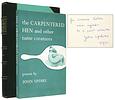 NY, Harper & Brothers, (1958). His first book, a collection of poems, published in an edition of 2000 copies. Inscribed by the author in 1990: "For ___ ___/ warm regards to a great collector/ John Updike." The recipient was a neighbor of Updike, in addition to being a collector of his books. Trace foxing to edge of text block, else fine in a fine, price-clipped, first issue dust jacket, which ends with "two children" on the rear flap. A beautiful copy of a book that is known for its binding coming loose. With a custom three quarter leather clamshell case from the Praxis Bindery.
[#030844]
SOLD
NY, Harper & Brothers, (1958). His first book, a collection of poems, published in an edition of 2000 copies. Inscribed by the author in 1990: "For ___ ___/ warm regards to a great collector/ John Updike." The recipient was a neighbor of Updike, in addition to being a collector of his books. Trace foxing to edge of text block, else fine in a fine, price-clipped, first issue dust jacket, which ends with "two children" on the rear flap. A beautiful copy of a book that is known for its binding coming loose. With a custom three quarter leather clamshell case from the Praxis Bindery.
[#030844]
SOLD
UPDIKE, John
 [NY], (Scientific American), (1969). The first separate edition of this physics-themed poem. One of 6200 copies printed as Christmas cards to be issued with W.H. Auden's A New Year Greeting (not present). 24 pages, illustrated. Fine in stapled wrappers. Lacking the cardboard sleeve that combined the two booklets, but in a custom three quarter leather clamshell case from the Praxis Bindery. This copy is inscribed by the author: "For ___/ Merry Christmas 1995/ John Updike [with a drawing of holly leaves and berries]." While the print run of this item was not particularly small, especially when compared with the many limited editions Updike has done, the nature of its distribution -- as a freebie to Scientific American subscribers -- suggests that most copies would have been lost or discarded.
[#030850]
$1,500
[NY], (Scientific American), (1969). The first separate edition of this physics-themed poem. One of 6200 copies printed as Christmas cards to be issued with W.H. Auden's A New Year Greeting (not present). 24 pages, illustrated. Fine in stapled wrappers. Lacking the cardboard sleeve that combined the two booklets, but in a custom three quarter leather clamshell case from the Praxis Bindery. This copy is inscribed by the author: "For ___/ Merry Christmas 1995/ John Updike [with a drawing of holly leaves and berries]." While the print run of this item was not particularly small, especially when compared with the many limited editions Updike has done, the nature of its distribution -- as a freebie to Scientific American subscribers -- suggests that most copies would have been lost or discarded.
[#030850]
$1,500
UPDIKE, John
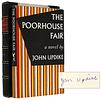 NY, Knopf, 1959. Updike's second book and first novel, nominated for the National Book Award and winner of the Richard and Hinda Rosenthal Foundation Award of the American Academy and Institute of Arts and Letters, for a novel which, despite not being a commercial success, was nonetheless "a considerable literary achievement." Signed by the author. With the bookplate of diplomat and ambassador John Moors Cabot on the front flyleaf: Cabot lived on Cape Ann, one town over from Updike. Fine in a near fine dust jacket, with a bit of rubbing to the front panel and a closed but crooked tear to the lower rear panel. In a custom three quarter leather clamshell case from the Praxis Bindery.
[#030845]
SOLD
NY, Knopf, 1959. Updike's second book and first novel, nominated for the National Book Award and winner of the Richard and Hinda Rosenthal Foundation Award of the American Academy and Institute of Arts and Letters, for a novel which, despite not being a commercial success, was nonetheless "a considerable literary achievement." Signed by the author. With the bookplate of diplomat and ambassador John Moors Cabot on the front flyleaf: Cabot lived on Cape Ann, one town over from Updike. Fine in a near fine dust jacket, with a bit of rubbing to the front panel and a closed but crooked tear to the lower rear panel. In a custom three quarter leather clamshell case from the Praxis Bindery.
[#030845]
SOLD
UPDIKE, John
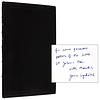 (NY/West Stockbridge/Prague), Thornwillow Press, 2002. One of the more attractive and lavishly produced limited editions in the Updike oeuvre. Three stories that appeared in the New Yorker ("Personal Archaeology," "Free," and "The Guardian") plus an Author's Note. Bound in full black leather with raised bands and gilt stamped spine; marbled endpapers; illustrated with tipped-in photographs; and laid into a velvet-lined black linen clamshell case. This is copy number 149 of 250 numbered copies, signed by Updike, by the photographer Mariana Cook, and by the designer Luke Ives Pontifell. This copy is additionally inscribed by Updike: "for some generous patron of the 2003 St. John's Fair/ with thanks, John Updike." Fine.
[#030861]
SOLD
(NY/West Stockbridge/Prague), Thornwillow Press, 2002. One of the more attractive and lavishly produced limited editions in the Updike oeuvre. Three stories that appeared in the New Yorker ("Personal Archaeology," "Free," and "The Guardian") plus an Author's Note. Bound in full black leather with raised bands and gilt stamped spine; marbled endpapers; illustrated with tipped-in photographs; and laid into a velvet-lined black linen clamshell case. This is copy number 149 of 250 numbered copies, signed by Updike, by the photographer Mariana Cook, and by the designer Luke Ives Pontifell. This copy is additionally inscribed by Updike: "for some generous patron of the 2003 St. John's Fair/ with thanks, John Updike." Fine.
[#030861]
SOLD
VELIKOVSKY, Immanuel
 1951, 1952, 1970. One typed letter signed, one autograph letter signed, and one autograph postcard signed by the controversial author of Worlds in Collision, Earth in Upheaval, and others. Velikovsky's books suggested that Earth's history was defined more by sudden catastrophes than by slow evolution. They became quite popular during the 1960s, when conventional wisdom of all sorts was being called into question. Each letter is written to a Mr. Tereshchenko: the first refutes two notions in a book by "Beaumont;" the second letter assures the recipient that the second volume of Ages [in Chaos] will be published and is being held up by Velikovsky himself; the third voices intent to send along a 1946 publication and explains that Ages in Chaos grew to a tetralogy. "Beaumont" is William Comyns Beaumont, a British author whom some claimed had advanced the notions put forward by Velikovsky a generation earlier. The first letter is secured across the midpoint fold with tape; very good. The second letter is on airmail paper; folded and opened as designed; else fine. The postcard is fine. Correspondence, or any autograph material, by Velikovsky is quite scarce, especially with significant content.
[#023981]
$1,750
1951, 1952, 1970. One typed letter signed, one autograph letter signed, and one autograph postcard signed by the controversial author of Worlds in Collision, Earth in Upheaval, and others. Velikovsky's books suggested that Earth's history was defined more by sudden catastrophes than by slow evolution. They became quite popular during the 1960s, when conventional wisdom of all sorts was being called into question. Each letter is written to a Mr. Tereshchenko: the first refutes two notions in a book by "Beaumont;" the second letter assures the recipient that the second volume of Ages [in Chaos] will be published and is being held up by Velikovsky himself; the third voices intent to send along a 1946 publication and explains that Ages in Chaos grew to a tetralogy. "Beaumont" is William Comyns Beaumont, a British author whom some claimed had advanced the notions put forward by Velikovsky a generation earlier. The first letter is secured across the midpoint fold with tape; very good. The second letter is on airmail paper; folded and opened as designed; else fine. The postcard is fine. Correspondence, or any autograph material, by Velikovsky is quite scarce, especially with significant content.
[#023981]
$1,750
VIZENOR, Gerald
VONNEGUT, Kurt
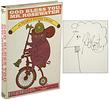 NY, Holt Rinehart Winston, (1965). A review copy of Vonnegut's sixth book, one of the novels that began earning him a small but passionate following in the mid-1960s, before his breakthrough to the status of "major author," which came when Slaughterhouse-Five was published. Signed by the author with a self-caricature. Owner signature of cartoonist Claude Smith under front flap; very slight loss to spine lettering; otherwise a fine copy in a near fine dust jacket with some unnecessary tape strengthening on verso and slight dampstaining, also on verso. With press release laid in. In a custom clamshell case.
[#029019]
SOLD
NY, Holt Rinehart Winston, (1965). A review copy of Vonnegut's sixth book, one of the novels that began earning him a small but passionate following in the mid-1960s, before his breakthrough to the status of "major author," which came when Slaughterhouse-Five was published. Signed by the author with a self-caricature. Owner signature of cartoonist Claude Smith under front flap; very slight loss to spine lettering; otherwise a fine copy in a near fine dust jacket with some unnecessary tape strengthening on verso and slight dampstaining, also on verso. With press release laid in. In a custom clamshell case.
[#029019]
SOLD
VONNEGUT, Kurt
 (n.p.), [Self-Published], 2003. One of 12 copies of this compilation, made by the author, of his six contributions to In These Times, from February 17 to June 9, 2003, including his four "Dear Mr. Vonnegut" columns. Fourteen photocopied pages (including covers), assembled by Kurt Vonnegut, signed by him on the first page prior to photocopying and signed in full with self-caricature on the rear cover after assembly. According to Vonnegut, one of only 12 copies he made. Spiralbound with acetate cover; fine. With hand-addressed mailing envelope. One of the scarcest "editions" in Vonnegut's canon.
[#029370]
SOLD
(n.p.), [Self-Published], 2003. One of 12 copies of this compilation, made by the author, of his six contributions to In These Times, from February 17 to June 9, 2003, including his four "Dear Mr. Vonnegut" columns. Fourteen photocopied pages (including covers), assembled by Kurt Vonnegut, signed by him on the first page prior to photocopying and signed in full with self-caricature on the rear cover after assembly. According to Vonnegut, one of only 12 copies he made. Spiralbound with acetate cover; fine. With hand-addressed mailing envelope. One of the scarcest "editions" in Vonnegut's canon.
[#029370]
SOLD
VONNEGUT, Kurt
 (n.p.), [Spiffing Books], 1994. A bootleg production printing a lecture Vonnegut gave at the Roosevelt Hotel in New York City on March 15, 1994 and also including the text of the question and answer session that followed. Two dozen pages of single-spaced text, plus as many pages of illustrations, mostly drawings by Vonnegut taken from Breakfast of Champions. Roughly 15000 words by Vonnegut that don't appear elsewhere. Fine in stapled wrappers. Rare: this is the only copy we have ever seen.
[#027144]
SOLD
(n.p.), [Spiffing Books], 1994. A bootleg production printing a lecture Vonnegut gave at the Roosevelt Hotel in New York City on March 15, 1994 and also including the text of the question and answer session that followed. Two dozen pages of single-spaced text, plus as many pages of illustrations, mostly drawings by Vonnegut taken from Breakfast of Champions. Roughly 15000 words by Vonnegut that don't appear elsewhere. Fine in stapled wrappers. Rare: this is the only copy we have ever seen.
[#027144]
SOLD
VONNEGUT, Kurt
 (n.p.), (Self-published), 2005. Seventeen poems by Vonnegut, computer printed, ringbound, and signed by Vonnegut on the front cover in blue pen, dated 5/26/05. Vonnegut made velobound photocopies of this collection for friends, but this is apparently the original copy he made: the only other one we have seen reproduced the signature and date on the front cover, whereas this signature and date are original. The poems herein were published, individually and in pairs, in issues of the Cornell Daily Sun beginning in October, 2005. They have not been published or collected elsewhere, other than this production that Vonnegut himself did. As it is, unique, and more of a typescript than an edition: the copies made from this one would constitute the edition. Fine.
[#032681]
SOLD
(n.p.), (Self-published), 2005. Seventeen poems by Vonnegut, computer printed, ringbound, and signed by Vonnegut on the front cover in blue pen, dated 5/26/05. Vonnegut made velobound photocopies of this collection for friends, but this is apparently the original copy he made: the only other one we have seen reproduced the signature and date on the front cover, whereas this signature and date are original. The poems herein were published, individually and in pairs, in issues of the Cornell Daily Sun beginning in October, 2005. They have not been published or collected elsewhere, other than this production that Vonnegut himself did. As it is, unique, and more of a typescript than an edition: the copies made from this one would constitute the edition. Fine.
[#032681]
SOLD
VONNEGUT, Kurt
 Barnstable, Crane Duplicating Service, (1966). The first separate appearance of this essay, which first appeared in Venture Magazine in 1964 and was later collected under a different title in Welcome to the Monkey House in 1968. Here printed as a Christmas greeting for friends of Crane Duplicating Service, located in Barnstable, a town where Vonnegut lived while raising a family and managing a Saab dealership. Two sheets folded to make eight pages; slight upper corner crease; else fine. Rare.
[#025012]
SOLD
Barnstable, Crane Duplicating Service, (1966). The first separate appearance of this essay, which first appeared in Venture Magazine in 1964 and was later collected under a different title in Welcome to the Monkey House in 1968. Here printed as a Christmas greeting for friends of Crane Duplicating Service, located in Barnstable, a town where Vonnegut lived while raising a family and managing a Saab dealership. Two sheets folded to make eight pages; slight upper corner crease; else fine. Rare.
[#025012]
SOLD
(WARHOL, Andy). BERRIGAN, Ted, ed.
 New York, Lorenz Gude & Ted Berrigan, 1963. The fourth issue of this mimeographed poetry journal, this issue being devoted to the work of poet Edwin Denby, with contributions by him as well as pieces about his work by Berrigan, Frank O'Hara and John Wieners. It is most famous at this point for the cover, which "was designed by Andy Warhol from photographs of poets Edwin Denby and Gerard Malanga." Warhol took a number of Polaroid photographs of Denby and Malanga and then created a silk screen from them for the covers. The clarity and resolution of the images vary from copy to copy of the production, either as a result of the screen getting clogged by re-use or as a result of deliberate manipulation by Warhol; in this copy, the images on the front are clearly two individuals but the resolution is limited and the image presents almost as an abstraction; the rear cover, which is a shot of the two poets kissing, is in this copy virtually entirely abstract. An early and important Warhol production: this is the first known instance of Warhol using Polaroid photographs for making silkscreen images, a practice he came back to later and became his standard approach for portraits. Corrections to the text in Berrigan's or Denby's hand. Some edge wear to the covers and the spine, and a tear at the base of the spine; overall very good in stapled wrappers.
[#032338]
SOLD
New York, Lorenz Gude & Ted Berrigan, 1963. The fourth issue of this mimeographed poetry journal, this issue being devoted to the work of poet Edwin Denby, with contributions by him as well as pieces about his work by Berrigan, Frank O'Hara and John Wieners. It is most famous at this point for the cover, which "was designed by Andy Warhol from photographs of poets Edwin Denby and Gerard Malanga." Warhol took a number of Polaroid photographs of Denby and Malanga and then created a silk screen from them for the covers. The clarity and resolution of the images vary from copy to copy of the production, either as a result of the screen getting clogged by re-use or as a result of deliberate manipulation by Warhol; in this copy, the images on the front are clearly two individuals but the resolution is limited and the image presents almost as an abstraction; the rear cover, which is a shot of the two poets kissing, is in this copy virtually entirely abstract. An early and important Warhol production: this is the first known instance of Warhol using Polaroid photographs for making silkscreen images, a practice he came back to later and became his standard approach for portraits. Corrections to the text in Berrigan's or Denby's hand. Some edge wear to the covers and the spine, and a tear at the base of the spine; overall very good in stapled wrappers.
[#032338]
SOLD
WATERS, Frank
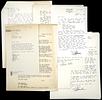 1986-1987. A collection of letters from Waters, mostly to his literary agent, Joan Daves, as well as related ancillary materials showing Waters at work in the after-market for his writing, with opportunities for later editions and film versions. Waters wrote primarily about the American Southwest, in particular the Native American experience. His father was part Cheyenne. The first typed letter signed is from Waters to his agent, Joan Daves, dated August 24, 1986 and concerns Lesley Ann Warren's interest in optioning the film rights to The Woman at Otowi Crossing and the contract for publication of a hardcover, illustrated edition of The Man Who Killed the Deer. It is stapled to a copy of the contract, with numerous marginal corrections and a retained copy of Daves' reply, agreeing with Waters that the intended publisher (Gibbs Smith) had overreached in the contract. An included exchange between Daves and Gibbs Smith posits a simpler agreement, while a retained carbon shows Daves reaching out to Ohio University Press to confirm they had no claim to hardcover rights. The second typed letter signed is from Waters to Keith Sabin, in Daves' absence, and is dated September 29, 1986 and describes the purchasing history of Flight from Fiesta and the current unwelcome "blitz" he, Waters, is undergoing from Ritz Productions regarding theatrical rights. Waters encloses an initialed copy of the letter he wrote to Ritz Productions redirecting their overtures to Daves upon her return from Europe. Both of these letters are stapled together with retained copies of both Sabin's and Daves' replies, as well as a retained copy of an earlier letter from Sabin to Waters saying they had been approached by Ritz and the initial contact letter from Ritz with an unsigned agreement for Right of First Refusal. Also included is a letter from Fiesta publisher Clark Kimball to Daves recommending the production company. The fourth typed letter signed, from Waters to Daves, dated April 29, 1987, again describes the publishing history of Flight from Fiesta and informs Daves that the publisher, Clark Kimball, has been approached by CBS-Columbia regarding film rights, and he includes Kimball's letter. Attached are the retained copies of letters from Daves to both Waters and Kimball, admonishing all that Kimball has no role in film rights for the title, and a later letter from Kimball acquiesces. The fifth typed letter signed, from Waters to Daves (August 3, 1987), delineates an additional inquiry regarding a film option for Flight from Fiesta and several leads on optioning The Woman at Otowi Crossing should Lesley Ann Warren's option expire. Waters takes Daves to task for not responding to offers already presented, for not keeping him informed, and for being about to depart for Europe leaving him without representation: "I don't like to end our agent-client relationship after so many years, but if the overload of work at this crucial time is too much for you, I don't see any alternative." A copy of a letter to Waters at about this point from Alton Walpole shows one of the interested parties facing obstacles bringing Otowi Crossing to the screen. Also, a letter to Daves from The University of Nevada thanks Daves for sending financials on Ohio University Press's Frank Waters: A Retrospective Anthology (included), but bemoans how infrequent the agent's communiques have become. However, the Daves-Waters agent-client relationship was ongoing in October: in the sixth typed letter signed in this archive, Waters informs Daves of yet another inquiry for Flight from Fiesta and asks her advice about payment on an opportunity he has to write the text for a book of photographs to be published by Arizona Highways (likely Eternal Desert, published in 1990). As mentioned, many of the letters are stapled; most are folded for mailing; in some instances they bear the agency's routing marks or highlighting. The lot as a whole is near fine.
[#031770]
$1,250
1986-1987. A collection of letters from Waters, mostly to his literary agent, Joan Daves, as well as related ancillary materials showing Waters at work in the after-market for his writing, with opportunities for later editions and film versions. Waters wrote primarily about the American Southwest, in particular the Native American experience. His father was part Cheyenne. The first typed letter signed is from Waters to his agent, Joan Daves, dated August 24, 1986 and concerns Lesley Ann Warren's interest in optioning the film rights to The Woman at Otowi Crossing and the contract for publication of a hardcover, illustrated edition of The Man Who Killed the Deer. It is stapled to a copy of the contract, with numerous marginal corrections and a retained copy of Daves' reply, agreeing with Waters that the intended publisher (Gibbs Smith) had overreached in the contract. An included exchange between Daves and Gibbs Smith posits a simpler agreement, while a retained carbon shows Daves reaching out to Ohio University Press to confirm they had no claim to hardcover rights. The second typed letter signed is from Waters to Keith Sabin, in Daves' absence, and is dated September 29, 1986 and describes the purchasing history of Flight from Fiesta and the current unwelcome "blitz" he, Waters, is undergoing from Ritz Productions regarding theatrical rights. Waters encloses an initialed copy of the letter he wrote to Ritz Productions redirecting their overtures to Daves upon her return from Europe. Both of these letters are stapled together with retained copies of both Sabin's and Daves' replies, as well as a retained copy of an earlier letter from Sabin to Waters saying they had been approached by Ritz and the initial contact letter from Ritz with an unsigned agreement for Right of First Refusal. Also included is a letter from Fiesta publisher Clark Kimball to Daves recommending the production company. The fourth typed letter signed, from Waters to Daves, dated April 29, 1987, again describes the publishing history of Flight from Fiesta and informs Daves that the publisher, Clark Kimball, has been approached by CBS-Columbia regarding film rights, and he includes Kimball's letter. Attached are the retained copies of letters from Daves to both Waters and Kimball, admonishing all that Kimball has no role in film rights for the title, and a later letter from Kimball acquiesces. The fifth typed letter signed, from Waters to Daves (August 3, 1987), delineates an additional inquiry regarding a film option for Flight from Fiesta and several leads on optioning The Woman at Otowi Crossing should Lesley Ann Warren's option expire. Waters takes Daves to task for not responding to offers already presented, for not keeping him informed, and for being about to depart for Europe leaving him without representation: "I don't like to end our agent-client relationship after so many years, but if the overload of work at this crucial time is too much for you, I don't see any alternative." A copy of a letter to Waters at about this point from Alton Walpole shows one of the interested parties facing obstacles bringing Otowi Crossing to the screen. Also, a letter to Daves from The University of Nevada thanks Daves for sending financials on Ohio University Press's Frank Waters: A Retrospective Anthology (included), but bemoans how infrequent the agent's communiques have become. However, the Daves-Waters agent-client relationship was ongoing in October: in the sixth typed letter signed in this archive, Waters informs Daves of yet another inquiry for Flight from Fiesta and asks her advice about payment on an opportunity he has to write the text for a book of photographs to be published by Arizona Highways (likely Eternal Desert, published in 1990). As mentioned, many of the letters are stapled; most are folded for mailing; in some instances they bear the agency's routing marks or highlighting. The lot as a whole is near fine.
[#031770]
$1,250
WELSH, Irvine
 London, Secker & Warburg, (1993). The uncorrected proof copy of his first novel, acclaimed upon publication and later the basis for the phenomenally successful movie that became a cultural milestone of the 1990s. The first edition of this book is scarce -- preceding the movie and its associated cultural uproar by a couple of years, it was issued in a hardcover edition reported at only 600 copies; the proof is many times scarcer; we have seen it only a handful of times. This copy is signed by Welsh. Shallow corner creases; very near fine in wrappers.
[#911191]
SOLD
London, Secker & Warburg, (1993). The uncorrected proof copy of his first novel, acclaimed upon publication and later the basis for the phenomenally successful movie that became a cultural milestone of the 1990s. The first edition of this book is scarce -- preceding the movie and its associated cultural uproar by a couple of years, it was issued in a hardcover edition reported at only 600 copies; the proof is many times scarcer; we have seen it only a handful of times. This copy is signed by Welsh. Shallow corner creases; very near fine in wrappers.
[#911191]
SOLD
WEST, Nathanael
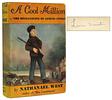 NY, Covici Friede, (1934). The third book by the author of Miss Lonelyhearts and the classic Hollywood novel The Day of the Locust. This is West's sister's copy, with her ownership signature, "Laura Weinstein," on the front flyleaf. West dedicated this copy to his college friend, the comic writer S.J. Perelman, who married Laura in 1929; she was Perelman's co-writer on several screenplays, including Around the World in Eighty Days and two Marx Brothers films, among others; she would later be the dedicatee of West's The Day of the Locust. Nathanael West was born "Nathan Weinstein." Although his sister, Lorraine Weinstein, would later change her name to Laura West and then to Laura Perelman, this book and other of her brother's books that came out of S.J. Perelman's library (and are now in the Special Collections of Brown University) were signed as "Laura Weinstein." Modest foxing to boards, endpages and page edges; a very good copy in a very good dust jacket with a bit of sunning on and near the spine and a few very small edge chips. A much nicer than usual copy of this novel and a unique family association copy as well as being owned by the wife of the dedicatee; one of the best copies imaginable. In a custom clamshell case.
[#032700]
SOLD
NY, Covici Friede, (1934). The third book by the author of Miss Lonelyhearts and the classic Hollywood novel The Day of the Locust. This is West's sister's copy, with her ownership signature, "Laura Weinstein," on the front flyleaf. West dedicated this copy to his college friend, the comic writer S.J. Perelman, who married Laura in 1929; she was Perelman's co-writer on several screenplays, including Around the World in Eighty Days and two Marx Brothers films, among others; she would later be the dedicatee of West's The Day of the Locust. Nathanael West was born "Nathan Weinstein." Although his sister, Lorraine Weinstein, would later change her name to Laura West and then to Laura Perelman, this book and other of her brother's books that came out of S.J. Perelman's library (and are now in the Special Collections of Brown University) were signed as "Laura Weinstein." Modest foxing to boards, endpages and page edges; a very good copy in a very good dust jacket with a bit of sunning on and near the spine and a few very small edge chips. A much nicer than usual copy of this novel and a unique family association copy as well as being owned by the wife of the dedicatee; one of the best copies imaginable. In a custom clamshell case.
[#032700]
SOLD
(WEST, Nathanael). HUXLEY, Aldous
 London, Chatto & Windus, 1931. Nathanael West's copy of Huxley's collection of poetry, with West's holograph notes on five of the front and rear endpages. Approximately 250 words, mostly quotes of other writers -- Huxley, Gray, Shakespeare; some light, but most quite serious: "In matters of love it is absurd to stand on your dignity and claim your rights. Such experiences cannot be judged and calculated like a matter of business. One gives as much and as long as one can & one does not bargain. Take what is given to you." West concludes with: "The paths of glory lead but to the grave." The year this book was published, West published his first novel. Later in the 1930s, both West and Huxley were employed as Hollywood screenwriters. West died in 1940 at the age of 37. The provenance of this book leads from West to his brother-in-law, S.J. Perelman, to the writer and bookseller, George Sims, who recounts the circumstances of his purchasing books from Perelman in the early 1970s, presumably including this one. A photocopy of a note from Sims is laid in. Fading to spine, spotting to cloth, short tear to lower front joint; still very good, without dust jacket. Publisher's extra spine label tipped to rear free endpaper. A wonderful glimpse of West's musings and inner life.
[#017974]
SOLD
London, Chatto & Windus, 1931. Nathanael West's copy of Huxley's collection of poetry, with West's holograph notes on five of the front and rear endpages. Approximately 250 words, mostly quotes of other writers -- Huxley, Gray, Shakespeare; some light, but most quite serious: "In matters of love it is absurd to stand on your dignity and claim your rights. Such experiences cannot be judged and calculated like a matter of business. One gives as much and as long as one can & one does not bargain. Take what is given to you." West concludes with: "The paths of glory lead but to the grave." The year this book was published, West published his first novel. Later in the 1930s, both West and Huxley were employed as Hollywood screenwriters. West died in 1940 at the age of 37. The provenance of this book leads from West to his brother-in-law, S.J. Perelman, to the writer and bookseller, George Sims, who recounts the circumstances of his purchasing books from Perelman in the early 1970s, presumably including this one. A photocopy of a note from Sims is laid in. Fading to spine, spotting to cloth, short tear to lower front joint; still very good, without dust jacket. Publisher's extra spine label tipped to rear free endpaper. A wonderful glimpse of West's musings and inner life.
[#017974]
SOLD
WHARTON, Edith and PARRISH, Maxfield
 NY, Century, 1904. The first and only edition of this nonfiction volume, heavily illustrated with photographs, drawings, and 26 full-color plates by Maxfield Parrish. This copy has a three-page autograph letter signed from Edith Wharton tipped in, written to Mrs. Sage, who, along with her husband, were friends of Maxfield Parrish and collectors of his paintings. Wharton's letter is a gracious response: apparently Mrs. Sage had indicated that Wharton's book had been a great help to her and that she was sending Wharton a Piranesi etching of Villa d'Este as a thank you. Also tipped-in is a two-page autograph letter signed from Parrish, written in his elegant, calligraphic hand, and referring to four of his paintings from the Eugene Field children's book, Poems of Childhood, that the Sages own and that Scribner's wanted permission to reproduce. The Field book was the first publication in which Parrish's paintings were reproduced in full color. One of the paintings mentioned, Wynken, Blynken and Nod, sold recently at Sotheby's for $845,000. This copy of Italian Villas and Their Gardens has been extra-illustrated, presumably by Mrs. Sage, with images of various Italian villas, including a large image of Villa d'Este on the front free endpaper and another on the verso of the Parrish illustration of it in the body of the text. The owner's small, tasteful bookplate adorns the front pastedown. A unique copy of this beautiful book, with a history of personal connections to the author and illustrator and subject matter.
[#026911]
SOLD
NY, Century, 1904. The first and only edition of this nonfiction volume, heavily illustrated with photographs, drawings, and 26 full-color plates by Maxfield Parrish. This copy has a three-page autograph letter signed from Edith Wharton tipped in, written to Mrs. Sage, who, along with her husband, were friends of Maxfield Parrish and collectors of his paintings. Wharton's letter is a gracious response: apparently Mrs. Sage had indicated that Wharton's book had been a great help to her and that she was sending Wharton a Piranesi etching of Villa d'Este as a thank you. Also tipped-in is a two-page autograph letter signed from Parrish, written in his elegant, calligraphic hand, and referring to four of his paintings from the Eugene Field children's book, Poems of Childhood, that the Sages own and that Scribner's wanted permission to reproduce. The Field book was the first publication in which Parrish's paintings were reproduced in full color. One of the paintings mentioned, Wynken, Blynken and Nod, sold recently at Sotheby's for $845,000. This copy of Italian Villas and Their Gardens has been extra-illustrated, presumably by Mrs. Sage, with images of various Italian villas, including a large image of Villa d'Este on the front free endpaper and another on the verso of the Parrish illustration of it in the body of the text. The owner's small, tasteful bookplate adorns the front pastedown. A unique copy of this beautiful book, with a history of personal connections to the author and illustrator and subject matter.
[#026911]
SOLD
WHITE, Randy Wayne
 NY, St. Martin's, (1993). A dedication copy of the third of White's popular Florida mysteries featuring marine biologist, Doc Ford. Inscribed by White to Peter Matthiessen: "For Peter Matthiessen, to whom this book is dedicated. Thanks for your friendship over many years. Randy Wayne White/ Pineland, Florida/ January, 1994." Matthiessen is the sixth of 15 people White names on the dedication page as "allies who have, during many travels and trails, proven steadfast in their friendship and unfailing in their support." White has been called "the rightful heir to John D. MacDonald" for his Doc Ford series; Ford is a marine biologist and the mysteries have been highly praised for their sensitivity to the Florida environment and ecology. Matthiessen of course won the National Book Award for his Florida trilogy that became Shadow Country. Light foxing to the endpages and page edges; near fine in a near fine dust jacket with a bit of wear to the crown.
[#031545]
SOLD
NY, St. Martin's, (1993). A dedication copy of the third of White's popular Florida mysteries featuring marine biologist, Doc Ford. Inscribed by White to Peter Matthiessen: "For Peter Matthiessen, to whom this book is dedicated. Thanks for your friendship over many years. Randy Wayne White/ Pineland, Florida/ January, 1994." Matthiessen is the sixth of 15 people White names on the dedication page as "allies who have, during many travels and trails, proven steadfast in their friendship and unfailing in their support." White has been called "the rightful heir to John D. MacDonald" for his Doc Ford series; Ford is a marine biologist and the mysteries have been highly praised for their sensitivity to the Florida environment and ecology. Matthiessen of course won the National Book Award for his Florida trilogy that became Shadow Country. Light foxing to the endpages and page edges; near fine in a near fine dust jacket with a bit of wear to the crown.
[#031545]
SOLD
WILDER, Thornton
 NY, Harper, (1967). The three-time Pulitzer Prize-winning (Our Town, The Skin of Our Teeth, The Bridge of San Luis Rey) author's National Book Award winning novel. Inscribed by the author: "For JEAN and WALTER with deep regard and affection ever/ Thornton/ March 21, 1967." As with at least three other copies of this title that Wilder inscribed, the recipients' names are in large block letters, while the bulk of the inscription is in Wilder's small cursive. We do know that Wilder was in New York on the date of this signing, and that he had reason to behold the Pulitzer Prize-winning critic Walter Kerr and his wife, the writer Jean Kerr (of Please Don't Eat the Daisies fame) with deep regard and affection: Walter Kerr lauded Wilder's work repeatedly in the 1960s, from his off-Broadway work ("the very special voice of Thornton Wilder...the homely, jaunty, gently poetic sound of it..."), to the cultural phenomenon that was Hello, Dolly!, which was based on Wilder's The Matchmaker. Fine in a fine dust jacket. A gorgeous, inscribed copy of a National Book Award winner.
[#030149]
$1,500
NY, Harper, (1967). The three-time Pulitzer Prize-winning (Our Town, The Skin of Our Teeth, The Bridge of San Luis Rey) author's National Book Award winning novel. Inscribed by the author: "For JEAN and WALTER with deep regard and affection ever/ Thornton/ March 21, 1967." As with at least three other copies of this title that Wilder inscribed, the recipients' names are in large block letters, while the bulk of the inscription is in Wilder's small cursive. We do know that Wilder was in New York on the date of this signing, and that he had reason to behold the Pulitzer Prize-winning critic Walter Kerr and his wife, the writer Jean Kerr (of Please Don't Eat the Daisies fame) with deep regard and affection: Walter Kerr lauded Wilder's work repeatedly in the 1960s, from his off-Broadway work ("the very special voice of Thornton Wilder...the homely, jaunty, gently poetic sound of it..."), to the cultural phenomenon that was Hello, Dolly!, which was based on Wilder's The Matchmaker. Fine in a fine dust jacket. A gorgeous, inscribed copy of a National Book Award winner.
[#030149]
$1,500
WOLFF, Tobias
 NY, Ecco, (1981). The scarce first issue of the author's first collection of short fiction, with the dust jacket with a "$14.95" price. The price was lowered to $10.95 prior to publication and the later jacket was printed with the lower price. Signed by the author. Faint foxing to cloth; near fine in a near fine, lightly spine-tanned dust jacket with a closed edge tear at the upper front spine fold.
[#915757]
SOLD
NY, Ecco, (1981). The scarce first issue of the author's first collection of short fiction, with the dust jacket with a "$14.95" price. The price was lowered to $10.95 prior to publication and the later jacket was printed with the lower price. Signed by the author. Faint foxing to cloth; near fine in a near fine, lightly spine-tanned dust jacket with a closed edge tear at the upper front spine fold.
[#915757]
SOLD
WOLFF, Tobias
 NY, Ecco Press, (1984). An association copy of his third book, a novella, about three paratroopers waiting to be shipped to Vietnam. Warmly inscribed to Andre Dubus and his wife: "For my dear friends Andre and Peggy, on the occasion of the annual Dubus-Wolff cut-up, foot-stomp, and blue-fish slaughter - may their finny souls swim in peace. Until next time, Love, Toby/ Bradford, August 19, 1984." Bradford would be Bradford College, where Dubus taught. In addition to being masters of the short story and memoir, Wolff and Dubus, relatively early in their friendship at the time of this inscription, were close friends through their lives, until Dubus' death in 1999. Wolff provided the introduction to Dubus' 1991 collection Broken Vessels. Dubus would review this book, The Barracks Thief, in September, 1989 in the periodical America; in part: "If words on paper could make sounds, you would hear me shouting now, urging you to read this book." Winner of the PEN Faulkner Award. A bit of dampstaining to the lower front board; near fine in a dust jacket with some dampstaining to the verso, thus very good. A wonderful literary association.
[#032922]
SOLD
NY, Ecco Press, (1984). An association copy of his third book, a novella, about three paratroopers waiting to be shipped to Vietnam. Warmly inscribed to Andre Dubus and his wife: "For my dear friends Andre and Peggy, on the occasion of the annual Dubus-Wolff cut-up, foot-stomp, and blue-fish slaughter - may their finny souls swim in peace. Until next time, Love, Toby/ Bradford, August 19, 1984." Bradford would be Bradford College, where Dubus taught. In addition to being masters of the short story and memoir, Wolff and Dubus, relatively early in their friendship at the time of this inscription, were close friends through their lives, until Dubus' death in 1999. Wolff provided the introduction to Dubus' 1991 collection Broken Vessels. Dubus would review this book, The Barracks Thief, in September, 1989 in the periodical America; in part: "If words on paper could make sounds, you would hear me shouting now, urging you to read this book." Winner of the PEN Faulkner Award. A bit of dampstaining to the lower front board; near fine in a dust jacket with some dampstaining to the verso, thus very good. A wonderful literary association.
[#032922]
SOLD
WOOLF, Virginia
 NY, Harcourt Brace, 1921. The first American edition of this early collection of short fiction, in which Woolf explores the stream of consciousness technique that she used to great effect in later novels. One of only 1500 copies, this copy in the black cloth binding. Slight foxing to cloth; near fine in a very near fine, price-clipped dust jacket, professionally, preemptively strengthened on the verso along the folds. A beautiful copy; easily the most attractive one we've seen.
[#023688]
SOLD
NY, Harcourt Brace, 1921. The first American edition of this early collection of short fiction, in which Woolf explores the stream of consciousness technique that she used to great effect in later novels. One of only 1500 copies, this copy in the black cloth binding. Slight foxing to cloth; near fine in a very near fine, price-clipped dust jacket, professionally, preemptively strengthened on the verso along the folds. A beautiful copy; easily the most attractive one we've seen.
[#023688]
SOLD
YATES, Richard
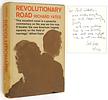 Boston, Little Brown, (1961). His influential first novel, made into a well-received film almost fifty years after the book's publication. Inscribed by the author in the year of publication, to Paul Cubeta, assistant director of Bread Loaf Writers' Conference, (which Yates attended in 1960 and again in 1962, where he had a legendary mental breakdown): "For Paul Cubeta - who makes everything go and keeps everything quiet. With more gratitude than he can possibly use and more respect than he will ever believe./ Dick Yates/ 8/30/61." A heartfelt association copy of one of the most acclaimed first novels of its era. Yates went on to teach at the Iowa Writers Workshop; later, in New Hampshire, he was effectively the "dean" of New England writers -- a model and mentor to John Irving, Andre Dubus, and others. Foxing and staining to page edges, otherwise a near fine copy in a very good dust jacket with one edge chip and some blended staining to the spine.
[#032923]
SOLD
Boston, Little Brown, (1961). His influential first novel, made into a well-received film almost fifty years after the book's publication. Inscribed by the author in the year of publication, to Paul Cubeta, assistant director of Bread Loaf Writers' Conference, (which Yates attended in 1960 and again in 1962, where he had a legendary mental breakdown): "For Paul Cubeta - who makes everything go and keeps everything quiet. With more gratitude than he can possibly use and more respect than he will ever believe./ Dick Yates/ 8/30/61." A heartfelt association copy of one of the most acclaimed first novels of its era. Yates went on to teach at the Iowa Writers Workshop; later, in New Hampshire, he was effectively the "dean" of New England writers -- a model and mentor to John Irving, Andre Dubus, and others. Foxing and staining to page edges, otherwise a near fine copy in a very good dust jacket with one edge chip and some blended staining to the spine.
[#032923]
SOLD
YATES, Richard
 (NY), Delacorte, (1976). One of Yates's most acclaimed novels. This copy is inscribed by the author: "For Wendy, Who is suited in every way to be one of the best mothers in the world, in the hope that her baby is a girl who'll turn out to be exactly like her. With love always, Dick. 9/15/76." The recipient, Wendy Sears, had been Yates's girlfriend in the early 1960s. He obviously still held her in high regard. Cocked, with some of the page signatures darkening; very good in a very good, spine-faded dust jacket with modest edge wear and one tear at the upper rear panel.
[#030878]
SOLD
(NY), Delacorte, (1976). One of Yates's most acclaimed novels. This copy is inscribed by the author: "For Wendy, Who is suited in every way to be one of the best mothers in the world, in the hope that her baby is a girl who'll turn out to be exactly like her. With love always, Dick. 9/15/76." The recipient, Wendy Sears, had been Yates's girlfriend in the early 1960s. He obviously still held her in high regard. Cocked, with some of the page signatures darkening; very good in a very good, spine-faded dust jacket with modest edge wear and one tear at the upper rear panel.
[#030878]
SOLD
For notifications of our sale lists, new arrivals, new catalogs, or other e-lists, subscribe to our email list:
